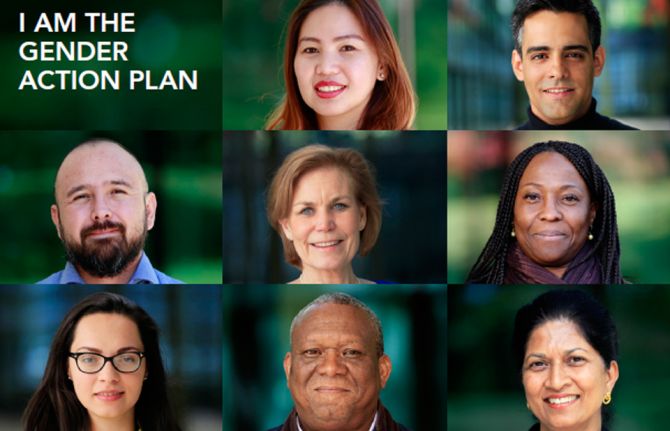

Feature Story
Leadership as a process of influence
11 June 2019
11 June 2019 11 June 2019Accelerating progress towards gender equality and the empowerment of women is fundamental to ending the AIDS epidemic. And it starts within UNAIDS.
In 2018, UNAIDS released its Gender Action Plan 2018-2023 aimed at improving the effectiveness of UNAIDS by promoting women’s leadership across the organization and ensuring that all staff, women and men, are aware of the issues that increase women’s risk of HIV infection.
The first annual progress report of the Gender Action Plan 2018-2023 shows progress in reaching its targets although much remains to be done. “The Gender Action Plan is a tool for change,” according to Gunilla Carlsson, UNAIDS Executive Director, a.i. “Building on the impressive progress made over just the first year of its implementation, it is key to keep up the momentum and sustain achievements over time.”
Of the 30 actions identified to achieve the four targets set out in the five-year Gender Action Plan, UNAIDS successfully advanced in 20 of them over the first 12 months. “The Gender Action Plan matters because it is about equality, balance, justice and fairness”, said Helene Badini, Regional Community Advisor in UNAIDS’ regional support team in Dakar, Senegal.
The Plan includes training and mentorship opportunities, mandatory gender-related work objectives, and organization-wide support. “All the staff in my office have a learning objective on gender and I advocate against all gender-based violence,” reflected Francoise Ndayishimiye, UNAIDS Country Director in Gabon. “Also, as a member of UN Plus, I like to be connected with other HIV-positive women working at UNAIDS to unite our strengths and act together,” she added.
In the West and Central Africa region, the majority of UNAIDS staff are men and half of the UNAIDS country directors are women, leading small teams in countries belonging to a region struggling with one of the fastest growing AIDS epidemics globally and severe challenges relating to security, humanitarian and natural disasters. Marie Engel, UNAIDS Regional Programme Advisor in Dakar believes that “having a network of women colleagues is a powerful and unique tool to advance women’s leadership, and this is why in my current role I am facilitating collaboration between the West and Central Africa alumnae of the Women’s Leadership Programme”.
The Gender Action Plan recalls that gender equality is a human right and critical to the performance and effectiveness of UNAIDS. The importance of advancing gender equality, including through the achievement of gender parity, is now recognized to an increased extent.
The plan, which is primarily for staff, rapidly translates into programmatic action. In the Democratic Republic of Congo, for example, UNAIDS helps women involved in civil society networks of people living with HIV to develop their skills and to reduce self-discrimination and self-stigma. Network members travelled to New York in 2018 to participate in the Commission on the Status of Women to share their experiences. The woman behind this work is Natalie Marini Nyamungu, a human rights and gender equality advisor in the UNAIDS’ country office.
“I developed skills that allowed me to create a positive work environment with equality and respect for diversity at its core, and without discrimination or prejudice,” said Ms Nyamungu. “I have also helped our civil society partners develop the new skills, resources and self-confidence that they needed to boost their own leadership.”
Supporting women’s leadership is central to the Gender Action Plan. The experience of female staff at UNAIDS has convinced many that leadership is a process of influence, not just a position in the organizational hierarchy.
Aminata Ouattara, Executive Officer in the UNAIDS regional support team in Dakar sums it up.
“UNAIDS Gender Action Plan has had the same effect as when you hop on public transport. Instead of taking your own car, the bus will fight the traffic for you and get you where you want to be much faster.”.



